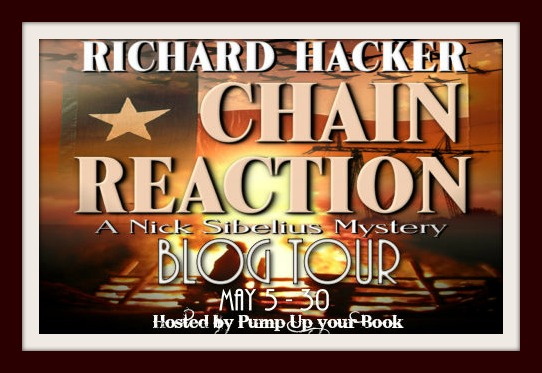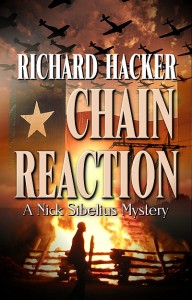CHAIN REACTION Released Today!
Posted: March 3, 2014 by jazzdog in Book Release, CHAIN REACTION, Crime, Novel, Pflugerville, Texas, ThrillerTags: book release, Chain Reaction, champagne books, crime, eBook, fiction, Nick Sibelius, novel, Richard Hacker, Texas, thriller, toxic relationship
The third book in the Nick Sibelius crime series is now officially out!
In Chain Reaction, Nick Sibelius and his partner Theresa Soliz take on a client caught in an apparent grudge between competitive bass fisherman, they discover they have unknowingly entangled themselves in the secessionist plot of healthcare magnate, Bruce Reynolds, to create the sovereign nation of Texas. Faced with Reynold’s remotely controlled drone air force, they make a desperate attempt to prevent civil war, while keeping their client alive and their relationship intact.
Praise for DIRTY WATER
“A must read for all murder mystery fans. 5 Stars” — Cozie Corner Blog
“…the mystery and suspense is present throughout.” — Texas Book Nook
“What do you get when you combine Politics, Texas, Murder, and Mystery mixed with a bit of romance? Well, you get Dirty Water. Richard Hacker has written a novel that will intrigue and fascinate readers. You will find yourself hanging on every word while waiting for the other ball to drop.” — My Reading Addiction
“This story has so many elements that makes it intriguing. Hacker has woven a tale of deception, politics, and crime solving and he has done a superb job of connecting all three…A great Mystery/Suspense read.” — A Life Through Books
“…a murder mystery with a touch of romance and domestic terrorism. From the start I found myself turning the pages to discover what was going to happen next. Four crowns.” — Queen of All She Reads
Writers League of Texas
Posted: February 28, 2014 by jazzdog in Award Winning, Conferences, Creativity, Novel, Texas, TOXIC RELATIONSHIP, Uncategorized, WritingTags: fantasy, sci-fi, Shaper, toxic relationship, WLT, writer, writers league of texas, writing
I’ve been featured on the Writers League of Texas blog to promote their literary contest. A sci-fi manuscript of mine, SHAPER, won in the sci-fi/fantasy category and the first Nick Sibelius novel, TOXIC RELATIONSHIP, was a finalist in the 2011 contest.
My Annual Holiday Blog Post!!!
Posted: December 9, 2013 by jazzdog in Award Winning, Creativity, DIRTY WATER, Texas, TOXIC RELATIONSHIPTags: blog, books, Christmas, creativity, DIRTY WATER, fiction, gifts, holidays, novel, Richard Hacker, Texas, toxic relationship, writing
Given it’s December, this must be my annual holiday blog post!!! I cannot offer unending pop star carols in the background, no flashing lights, fake snow on plastic trees or even a mocha pumpkin cinnamon double whip with red and green sprinkles. Sorry.
I can point out how this holiday month for various religious traditions is filled with one thing I think we can all agree is one of the most wonderful creations of human beings. No not the Easy Bake Oven. Although, now that it’s genderless (not exactly sure how ‘experts’ identify the gender of a toy oven– but that’s another blog) we can all make cup cakes with a light bulb. But I digress. The gift of the holiday season is story in all of its forms.
Whether you are Buddhist, Wiccan, Muslim, Christian, Jewish, Atheist, Secular Humanist, Great Spaghetti Monsterist, nothing or something in between or barely defined in your consciousness, we all carry around stories of what it means to be human in this world. And so we write short stories, plays, screen plays, poems, novels, radio plays, and every other form of story to answer one basic question–the same question Charlie Brown and Scrooge struggle to understand–Why am I here? What is the meaning of life?
Traditional holiday stories can have some depth and edge to them, although much of what we hear gets softened and homogenized to leave us with a taste of joy and hope. Nothing wrong with that. Besides, we have eleven other months in the year to get at the meaning of life through vampires, private investigators, serial killers, alien life forms, lustful lovers, and talking dogs.
So today I give you the gift of story. Yes, I bought it online at a steep discount and the shipping was free. That doesn’t mean I love you less.
Speaking of gift giving and stories. I humbly offer my two tales of Texas mayhem as the perfect stocking stuffer. TOXIC RELATIONSHIP and DIRTY WATER are both available at your favorite digital book store.
Happy Holidays.
Drone Killer
Posted: December 2, 2013 by jazzdog in Aviation, DIRTY WATER, Interview, Life, TexasTags: Amazon, blog, DIRTY WATER, drone, humor, interview, life, novel, Richard Hacker, Texas
I’ve got some great news for all of you good ol’ boys and geeks out there. Yeah, I know. How often do the stars align for Billy Bob and William Robert to find joy in the very same thing? Here it is. Amazon is planning on using drones to deliver packages. I know. How good is that? To get a real sense of how putting a few thousand package delivering drones into the air increases entertainment value in both cow pastures and urban landscapes, I visited two of my characters, Junior Pendleton and Izzy Zydeco to give their unique views on the subject.

I dropped in on Junior at the Huntsville State Penitentiary. He’s still a bit rattled by the bicycle rights terrorist, Cherry’s, rather ruckus visit (you’ll have to read DIRTY WATER to learn more). However, when I mentioned we might be talking about shooting stuff, he was all in.
Richard: Thanks for taking time out of your highly regimented and confined day for me.
Junior: Whatever you’re here to accuse me of, well I ain’t done it. Well, probably I did, but ain’t admitting nothing without my attorney present.
Richard: No worries, Junior. I want to talk with you about Jeff Bezos proposal to deliver packages by drone.
Junior: Always liked that clown. Although he’s a bit scary looking with all that red hair and that big old nose.
Richard: Not Bozo the Clown. Bezos, the CEO of Amazon. He wants to deliver packages using flying drones, you know, like little helicopters.
Junior: Well, I’ll be damned. (He leans back, hand behind his head, staring at a point somewhere above my head.) Could be fun.
Richard: Yes, that’s what I wanted to ask you about. What sorts of things do you imagine you and other like minded souls would do if you had Amazon drones flying over your property.
Junior: You kiddin’? Shoot ‘em. Yessir. Shoot those birds right out of the sky. They are on my god given sovereign air space, just like a turkey or duck or one of those damned grackles…
Richard: Given that you can carry a loaded AK-47 down the street in broad daylight, I suppose looking up to shoot a drone wouldn’t be too much of a stretch.
Junior: Stretch? Hell no! Besides, we’re talking about ‘alien’ drones from Amazon. I say shoot first, ask questions later. That’s what I did when that balloonist flew over my land. Trust me. Them wicker baskets don’t offer much in the way of protection. And I still don’t know why he didn’t have armor around his propane tank. I can still see that ol’ boy running from the wreckage when his tanks exploded. Whew! What a sight.
Richard: I’m not going to press the point that your way of thinking is what landed you in prison and just move on to other thoughts that come to you when you think of drones delivering packages.
Junior: Lemme see, here. You know, not that I’ve done this, but I’ve heard people follow UPS trucks and snag packages right off people’s porches. Of course with the price of gasoline and those damned web cams, it’s getting harder to do the deed and make a clean get away. So how’s about this? I follow me one of those alien drones and when I say I, I don’t mean me. So I follow the drone and then BLAM!. Shoot that sucker right out of the sky, crack open its little bucket like a piñata and make off with an XBox or some trousers or a lawn sprinkler or something. Now I would never do something like that, but I imagine someone with a mind sharper than my own will come up with it.
Richard: Thanks for you time–
Junior: Wait. I ain’t finished yet. Here’s another good one. Dynamite. Tie one to a helium balloon or put it under your own remote controlled helicopter, swing in close to one of them alien drones and KABLAM!! Now that’d be something to see.
I left Junior in the good hands of the Texas prison system and then got on a video call with Izzy Zydeco, bastard son of Governor Fran Adamson and virtual gaming entrepreneur. We won’t mention the whole illegitimate son thing since it’s a sore point for him. After some small talk we got right to it.
Izzy: I’m happy to share some of my brilliance with you. Of course, delivery drones will be a sea change in online gaming. Imagine, international teams of gamers controlling drones they’ve rented on a per minute basis to attack delivery drones.
Richard: I don’t think I understand, Izzy. Why would gamers want to shoot down a delivery drone?
Izzy: Were you born in a cave? Points, of course. If they’ll pay real money to buy virtual weapons and armor to get points, imagine what they’d pay to use a real flying weapons platform. We could add little machine guns, laser guided mini-missiles, the list is endless. Of course, they could always just ram them mid-air.
Richard: All for points. Wouldn’t they worry about breaking the law?
Izzy: I’m talking ultra-secure servers and heavy weight encryption. Not even the NSA will be able to figure out who pulled the trigger.
Richard: Although, they’d probably post their video and brag about the points they’re accumulating. So I would think the FBI–
Izzy: You are in a little box, man. Laws. Geeze, if I worried about breaking the law I’d never have become the success I am.
Richard: Kind of my point, Izzy. You’re advocating criminal activity.
Izzy: Hey, are you on a secure line?
Izzy ended the call and I have been unable to locate him. However, I think we can take away three things from these expert opinions:
- Delivery drones are coming
- Asking a guy in a cow pasture with a gun to not shoot down a passing drone is a bit too much to ask.
- The next big video game? Drone Killer.





